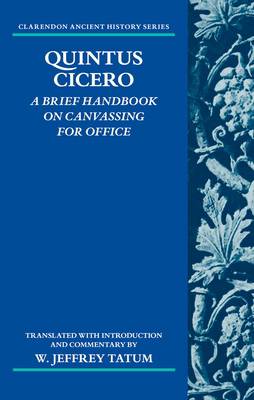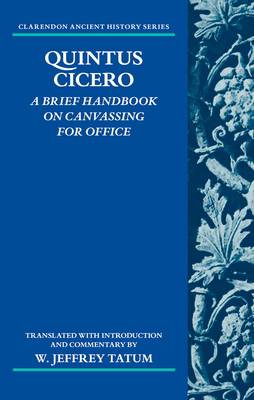
- Afhalen na 1 uur in een winkel met voorraad
- Gratis thuislevering in België vanaf € 30
- Ruim aanbod met 7 miljoen producten
- Afhalen na 1 uur in een winkel met voorraad
- Gratis thuislevering in België vanaf € 30
- Ruim aanbod met 7 miljoen producten
Zoeken
Quintus Cicero
A Brief Handbook on Canvassing for Office (Commentariolum Petitionis)
W Jeffrey Tatum
€ 209,45
+ 418 punten
Omschrijving
Rome's annual elections were central to the relationship between its citizenry and political leadership, and canvassing for office played no small part in their outcomes. The Brief Handbook on Canvassing for Office (Commentariolum Petitionis), composed by Quintus Cicero for his elder brother, the famous orator and statesman Marcus, is our fullest account of campaigning for office in republican Rome, incorporating candid advice on how best to mobilize political support from voters of every social class alongside searing political vituperation. This volume offers both the Latin text and a fresh translation of the Brief Handbook, as well as the first scholarly commentary on the text in the English language. Its purpose is to aid readers in their appreciation of the Brief Handbook in its multiple guises: as a literary text, an ideological document, a likely specimen of electoral propaganda, and a resource for recovering various aspects of late republican political and cultural history, such as group identities, Roman friendship, and civic rituals. While the comprehensive commentary clarifies the cultural, historical, and literary problems of the text, an incisive introduction supplies the reader with an account of the nature and practice of elections and canvassing for office in the late republic, as well as a detailed rehearsal of particular aspects of Cicero's career that provides the necessary context for understanding his campaign for the consulship in 64. The introduction also examines the literary dimensions of the work, and particularly the question of its authorship: considerations that are crucial to its proper interpretation as a historical source.
Specificaties
Betrokkenen
- Auteur(s):
- Uitgeverij:
Inhoud
- Aantal bladzijden:
- 354
- Taal:
- Engels
- Reeks:
Eigenschappen
- Productcode (EAN):
- 9780198153078
- Verschijningsdatum:
- 27/11/2018
- Uitvoering:
- Hardcover
- Formaat:
- Genaaid
- Afmetingen:
- 142 mm x 216 mm
- Gewicht:
- 589 g

Alleen bij Standaard Boekhandel
+ 418 punten op je klantenkaart van Standaard Boekhandel
Beoordelingen
We publiceren alleen reviews die voldoen aan de voorwaarden voor reviews. Bekijk onze voorwaarden voor reviews.











